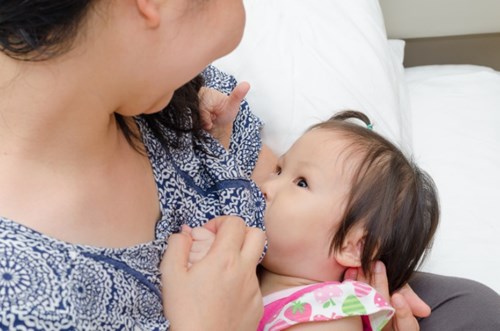Breastfeeding

Breastfeeding is the healthiest way to feed your baby, which is why more than 73% of UK mothers breastfeed.
Did you know?
- Your breast milk is perfectly designed for your baby
- Breast milk protects your baby from infections and diseases
- Breastfeeding can build a strong emotional bond between you and your baby
- Breast milk is available whenever your baby needs it
- Formula milk doesn’t provide the same illness protection or health benefits
Benefits
For your baby, breastfeeding reduces the risk of:
- Infections
- Diarrhoea and vomiting
- Sudden Infant Death Syndrome (cot death)
- Childhood leukaemia
- Obesity
For breastfeeding mums, it lowers your risk of:
- Breast and ovarian cancers
- Osteoporosis (weak bones)
- Obesity
- Cardiovascular disease
It can take time for both you and your baby to get the hang of breastfeeding, especially in the first few days, so don’t worry if you take a little longer than other new mothers. There’s plenty of breastfeeding advice and support available both locally and nationally.
Local support
Herefordshire Breastfeeding Information is run by Wye Valley NHS Trust and provides support and advice to help you reach your breastfeeding goal. The friendly service also offers different support groups, classes and workshops every month, along with information on baby friendly cafes and other support networks.
Herefordshire Children's Centre Services have seven locations across the county, all of which offer a range of different services for children and families, such as family health and early education. A number of centres also offer breastfeeding support and postnatal groups.
National support
- ABM (Association of Breastfeeding Mother’s)
- Better Health - Start for Life
- La Leche League
- National Breastfeeding Helpline
- NCT (National Childbirth Trust)
- NHS
- The Breastfeeding Companion
- The Breastfeeding Network
- Tommy’s
Top tips...
- It’s a good idea to find out as much about breastfeeding as you can, before your baby’s born. Antenatal classes normally cover the main elements of breastfeeding, such as positioning and attachment, expressing milk and how to tackle common problems.
- As soon as your baby is born, it’s important to make sure you have skin to skin contact. This not only encourages their first feed, but it also keeps them warm, calm and regulates their heart rate and breathing.
- Don’t worry about not producing enough milk for your baby, as the more you breastfeed, the more milk you will generate.
- It’s perfectly safe to breastfeed your baby whenever they’re hungry, as it’s not actually possible to overfeed a breastfed baby.
- If you’re leaking milk from your nipples in between feeds, you may wish to try expressing some milk or giving your baby another feed. You’ll find that breast pads can help prevent your clothing from becoming wet, but remember to regularly change them to prevent infection.
- It’s important to continue breastfeeding your baby, even once you’ve started to introduce them to more solid food at around six months old. This ensures they’re still getting enough energy and nutrients.
- Remember….You can continue breastfeeding for as long as both you and your baby are happy and comfortable to do so.
